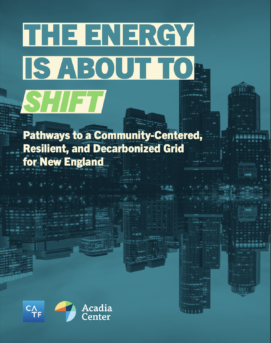A new report from Acadia Center and Clean Air Task Force (CATF) examines the critical role that community engagement will play in meeting New England’s 2050 decarbonization goals. The report highlights the opportunity to accelerate the region’s clean energy progress by addressing local concerns and better equipping communities to meaningfully participate in siting and approval processes.
Drawing from prominent case studies around the region, the report also identifies promising options for developers, communities, and policymakers to improve project planning and engagement, helping reduce the risk of failures, legal challenges, and delays. Without comprehensive reforms to improve community engagement processes and modernize siting and permitting policies, the region’s clean energy transition risks significant delays and setbacks.
- Part 1 of the report (Sections 1 – 3) examines the clean energy infrastructure needs for the New England region. To jump to part 1 of the report, click here.
- Part 2 of the report (Section 4 and Appendix) examines how to build a supportive community and policy environment for clean energy, while considering several case studies in the region. To jump to part 2 of the report, click here.
This report summarizes the findings of a year-long assessment, offering options and opportunities for both state and local governments, as well as for community stakeholders and project developers. As New England transitions from fossil fuels to a decarbonized, renewable grid, the success of this transformation will depend on active and meaningful community engagement. Without local buy-in, critical clean energy projects will continue to face significant headwinds and delays, putting the region’s climate goals at risk.
Webinar 1:
PowerPoint Slides: Energy is About to Shift_Webinar
Webinar 2:
PowerPoint Slides: Energy is About to Shift_Webinar 2



















